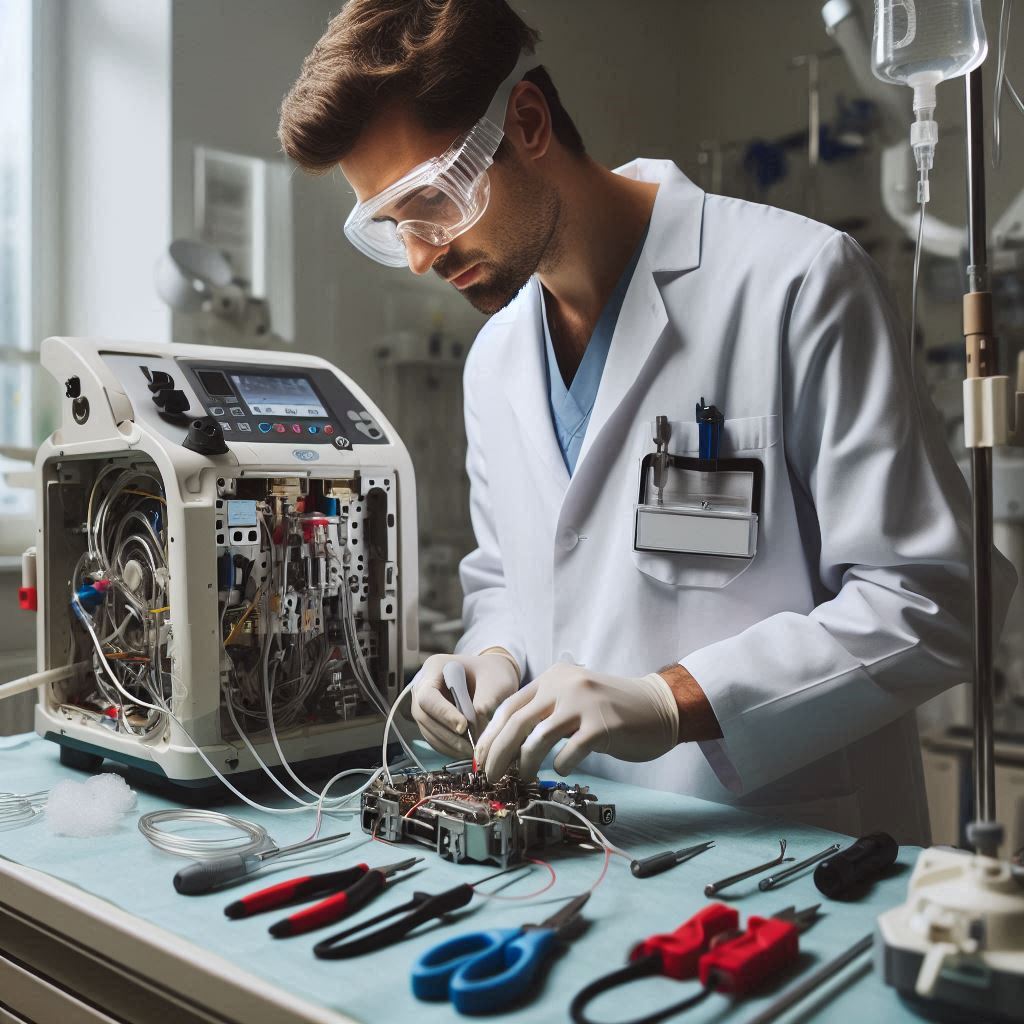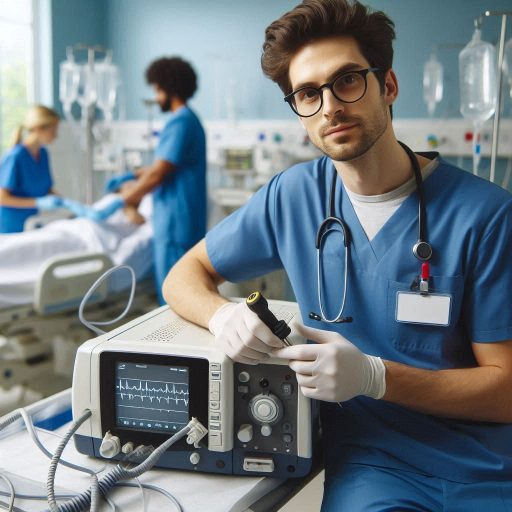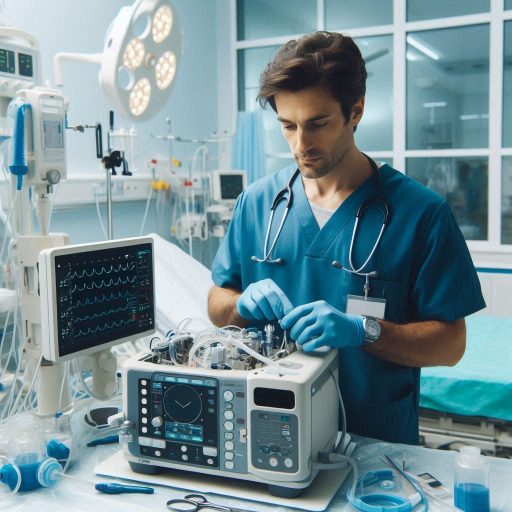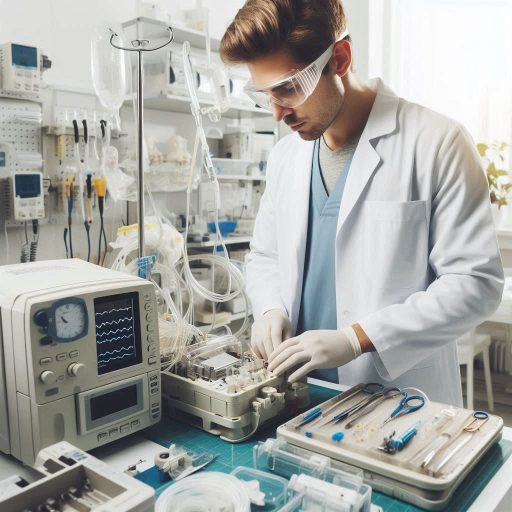Introduction
Biomedical equipment technicians are crucial to the healthcare industry.
They ensure medical devices function correctly, impacting patient care directly.
These technicians maintain and repair complex equipment, from MRI machines to infusion pumps.
Their work helps prevent equipment failures that could disrupt medical procedures.
Successful technicians excel in diagnosing issues, performing repairs, and conducting routine maintenance.
They often manage multiple devices, each requiring specific expertise.
Their ability to solve problems quickly ensures that healthcare providers can rely on accurate and functioning equipment.
Case studies showcase the essential skills and qualities of top technicians.
They highlight problem-solving abilities, technical expertise, and dedication to patient safety.
These real-world examples demonstrate how effective technicians handle challenging situations and contribute to improved healthcare outcomes.
By studying their successes, others in the field can learn valuable lessons and strive for excellence.
Biomedical equipment technicians are vital to healthcare.
Successful professionals play a critical role in maintaining equipment and enhancing patient care.
Case studies illuminate their skills and underscore their importance in the industry.
Case Study 1
Background information on a successful biomedical equipment technician
Meet Alex Thompson, a standout biomedical equipment technician whose career serves as an inspiring case study.
Alex‘s journey highlights the impact of dedication and skill in this essential field.
With a deep commitment to ensuring medical equipment operates flawlessly, Alex‘s contributions significantly enhance patient care.
Educational Background and Training
Alex began his career with a Bachelor‘s degree in Biomedical Engineering from a leading university.
This academic foundation provided a thorough understanding of medical technology and equipment.
After graduation, Alex pursued additional training in medical device maintenance and repair.
He completed specialized courses offered by professional organizations, including the Biomedical Equipment Technician (BMET) certification program.
This extensive training equipped him with the knowledge necessary to excel in his field.
Specific Skills and Certifications
Alex‘s success is largely attributed to his diverse skill set.
He possesses advanced troubleshooting abilities, which allow him to diagnose and resolve complex issues quickly.
His proficiency in preventative maintenance ensures that equipment remains in optimal working condition.
Alex holds several key certifications, including Certified Biomedical Equipment Technician (CBET) and Certified Radiology Equipment Specialist (CRES).
These certifications validate his expertise and enhance his credibility in the field.
Real-Life Examples of Successful Projects
One notable project involved repairing a malfunctioning MRI machine at a major hospital.
The machine had been out of service for weeks, causing delays in critical diagnostic imaging.
Alex diagnosed the problem as a faulty magnet cooling system.
He meticulously replaced the malfunctioning components and recalibrated the system.
His swift and effective repair work restored the MRI machine to full functionality, minimizing downtime and ensuring continued patient care.
In another instance, Alex led a comprehensive maintenance overhaul for a large medical facility‘s entire fleet of infusion pumps.
These pumps are crucial for administering medications accurately.
Alex implemented a rigorous maintenance schedule and conducted thorough inspections.
His efforts not only extended the lifespan of the equipment but also improved the reliability of medication delivery, enhancing overall patient safety.
Read: Online Courses for Surveying and Mapping Technicians
Case Study 2
Introduction to another successful biomedical equipment technician
Meet Alex Rivera, a standout biomedical equipment technician known for excellence in healthcare systems.
Alex‘s career journey reflects dedication and skill.
Starting as an entry-level technician, Alex quickly showcased a keen aptitude for troubleshooting and repair.
Their commitment to learning and improvement accelerated their career progression.
Career Progression and Experience
Alex began their career with a diploma in biomedical technology.
They joined a local hospital as a junior technician.
Over time, Alex earned certifications and gained hands-on experience with complex equipment.
Their proficiency in managing advanced machinery earned them promotions.
Today, Alex is a lead biomedical technician overseeing a team of experts.
Their career path includes key roles in maintaining MRI machines, ultrasound devices, and patient monitoring systems.
Alex‘s ability to adapt to technological advancements has been crucial.
They have also played a role in training new technicians, sharing valuable knowledge and experience.
Challenges Faced and Solutions
Alex faced several challenges throughout their career.
One major challenge was managing equipment failures during high-pressure situations.
They encountered situations where critical machines malfunctioned during emergency surgeries.
Alex‘s quick thinking and problem-solving skills enabled them to implement immediate solutions, minimizing downtime and ensuring patient safety.
Another challenge involved keeping up with rapid technological advancements.
Alex tackled this by pursuing continuous education and attending industry workshops.
Their proactive approach allowed them to stay updated with the latest technologies and best practices.
Testimonials from Colleagues and Supervisors
Colleagues and supervisors consistently praise Alex for their exceptional work ethic.
‘Alex‘s dedication is unmatched,‘ says Dr.Emily Thompson, a senior surgeon.
‘Their expertise ensures that our equipment operates flawlessly, which is crucial for patient care.
James Clark, a fellow technician, adds, ‘Alex‘s problem-solving skills are incredible.
They remain calm under pressure and always find effective solutions.
Maria Rodriguez, a hospital administrator, notes, ‘Alex‘s leadership and commitment to excellence have significantly improved our department‘s efficiency.
Alex Rivera‘s journey exemplifies the impact a dedicated biomedical equipment technician can have.
Their career progression, ability to overcome challenges, and the praise from colleagues highlight their vital role in healthcare.
Alex‘s story serves as an inspiring example for aspiring technicians and a reminder of the essential work they do in supporting healthcare systems.
Read: Surveying and Mapping Technician: Job Satisfaction

Find Out More: Top Resources for Database Administration News
Comparison of Case Studies
Analysis of similarities and differences between the two successful technicians
Biomedical equipment technicians play a critical role in healthcare.
Examining two successful technicians reveals both common traits and unique skills.
Common Traits and Skills
Both technicians share essential traits that drive their success.
They exhibit exceptional problem-solving abilities.
Their strong attention to detail ensures equipment operates correctly.
They possess excellent communication skills, vital for collaborating with medical staff.
Their dedication to ongoing learning helps them stay current with technology.
Each technician shows remarkable patience, crucial for troubleshooting complex issues.
Their technical skills are also impressive.
They excel in understanding complex systems and components.
Both technicians use diagnostic tools effectively to pinpoint problems.
They follow meticulous procedures for equipment maintenance and repair.
These skills are fundamental for their roles and ensure reliable healthcare operations.
Adapting to New Technologies
Adapting to new technologies is a shared strength.
The first technician embraced the shift to digital imaging systems.
They attended specialized training to master new software and hardware.
This proactive approach enabled them to integrate advanced imaging equipment seamlessly.
The second technician adapted by learning robotic surgery tools.
They kept up with rapid advancements in surgical technology.
Their ability to quickly learn and apply new techniques improved their facility‘s capabilities.
Impact on Patient Care and Hospital Operations
The impact of their work on patient care is profound.
The first technician‘s expertise in digital imaging improved diagnostic accuracy.
Physicians could rely on high-quality images for precise diagnoses.
This enhanced patient outcomes and streamlined treatment plans.
The second technician‘s work with robotic surgery tools led to better surgical precision.
Their quick adaptation minimized equipment downtime, supporting more efficient surgical procedures.
This not only improved patient safety but also increased overall surgical throughput.
Both technicians have significantly improved hospital operations.
Their skills ensure that critical equipment remains functional and up-to-date.
This reliability supports uninterrupted healthcare services.
Hospitals benefit from their ability to troubleshoot and resolve issues swiftly.
Their efforts reduce equipment-related delays and enhance operational efficiency.
Transform Your Career Today
Unlock a personalized career strategy that drives real results. Get tailored advice and a roadmap designed just for you.
Start NowRead: Importance of Accuracy in Surveying and Mapping
Benefits of Studying Successful Technicians
Importance of Learning from Real-Life Examples
Learning from real-life examples in biomedical technology is crucial for professional growth.
Case studies of successful technicians provide valuable insights into effective practices.
These stories showcase how technicians overcome challenges and excel in their roles.
By analyzing their experiences, aspiring technicians gain practical advice and inspiration.
Real-life examples also highlight the impact of meticulous work on patient care and safety.
Opportunities for Aspiring Technicians
Aspiring biomedical technicians have much to gain from studying successful professionals.
These case studies offer practical tips and techniques that go beyond textbooks.
Technicians who have navigated complex scenarios share strategies that can prevent common pitfalls.
Observing their problem-solving approaches helps new technicians develop critical thinking skills.
Networking with experienced professionals through seminars and workshops further enhances their learning opportunities.
Inspiration for Current Technicians
Current technicians can draw inspiration from these success stories to enhance their skills.
Seeing how peers have achieved excellence encourages continuous learning and improvement.
Technicians can adopt innovative practices and techniques demonstrated by their successful counterparts.
Case studies also provide a benchmark for evaluating one’s own performance and setting higher goals.
Emulating the best practices of industry leaders can lead to personal and professional growth.
Encouragement for Investment in Training and Mentorship
Hospitals and healthcare facilities should invest in training and mentorship programs for aspiring technicians.
Providing access to experienced professionals fosters skill development and knowledge transfer.
Structured programs ensure that new technicians receive guidance and support throughout their careers.
Mentorship helps bridge the gap between theoretical knowledge and practical application.
Investing in these programs ultimately enhances the overall quality of patient care.
Healthcare facilities benefit from a well-trained workforce capable of handling complex equipment and scenarios.
These investments not only improve technician performance but also contribute to better patient outcomes.
By prioritizing training and mentorship, institutions build a robust pipeline of skilled biomedical technicians.
This proactive approach ensures that the field continues to attract and develop top talent.
Read: Field vs. Office Work in Surveying and Mapping
Conclusion
In our blog, we explored successful case studies of biomedical equipment technicians.
These professionals made significant impacts through their expertise.
Their work showcases how crucial they are in healthcare settings.
Technicians ensure medical equipment runs smoothly, which is vital for patient care.
Their contributions directly affect the accuracy of diagnoses and the effectiveness of treatments.
One case highlighted a technician who resolved a major equipment failure in a time of crisis.
Another case demonstrated how proactive maintenance improved hospital efficiency.
These examples underline the critical role technicians play in healthcare systems.
Their skillful handling of complex equipment prevents downtime and enhances overall patient safety.
The blog emphasizes the importance of supporting these unsung heroes.
By learning from their success stories, we can better appreciate their impact on healthcare.
Readers should advocate for ongoing training and advancement in biomedical technology.
Support the growth of this field to ensure continued excellence in patient care.
Recognize the pivotal role of biomedical equipment technicians and encourage further development in their profession.
Their expertise is essential to maintaining high standards in healthcare.
[E-Books for Sale]
The Big Book of 500 High-Paying Jobs in America: Unlock Your Earning Potential
$19.99 • 500 High-Paying Jobs • 330 pages
Explore 500 high-paying jobs in America and learn how to boost your career, earn more, and achieve success!
See All 500 High-Paying Jobs of this E-Book
1001 Professions Without a Degree: High-Paying American Jobs You Can Start Now
$19.99 • 1001 Professions Without a Degree • 174 pages
Discover 1001 high-paying jobs without a degree! Unlock career tips, skills, and success strategies for just $19.99!




